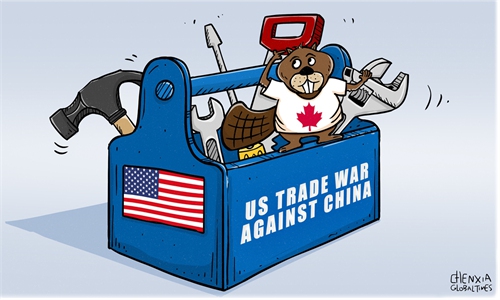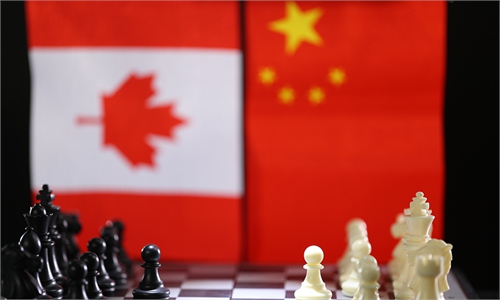
Photo: CFP
Compared with the optimism that the Canadian economy is expected to benefit from a rapid economic recovery in China, concerns about the future of bilateral trade seem more likely to prevail amid Ottawa's provocative China policy.Canada and China's Taiwan island on Tuesday agreed to start formal negotiations for a deal to encourage two-way foreign investments and deepen their Indo-Pacific partnership, according to Reuters.
Whatever the banner is, it fails to obscure the geopolitical thinking behind its behavior. It would be naive for anyone to truly believe that Canada is engaged in the so-called formal talks over investments with the island of Taiwan purely on economic grounds.
Trade between Canada and the island of Taiwan totaled 10.2 billion Canadian dollars ($7.6 billion) in 2021, a relatively low volume, indicating that they don't share close economic and trade cooperation or many complementarities. The island of Taiwan is not on the list of Canada's top 10 trading partners, and vice versa.
China and Canada are thousands of miles apart, and there is neither major conflict of interests nor geopolitical conflict. But the increasingly radical attitude toward China is driving Canada into unimaginable madness, such as the attempt to undermine the one-China principle by raising the political status of the Taiwan region under the banner of developing trade relations.
Chinese Foreign Ministry spokesperson Wang Wenbin already made it clear in January 2022 that China opposes official contact and agreement of official nature between countries having diplomatic ties with China and the Taiwan region. This position is clear and consistent. The Canadian government should abide by the one-China principle, and prudently and properly handle relevant issues.
When it comes to China policy, the Canadian government behaves like a person that is completely lost and only knows to blindly follow the US lead. For instance, Canada's so-called Indo-Pacific Strategy, released late last year, has basically copied Washington's geopolitical rhetoric in the part related to China, which is full of malice and prejudice against China. This is a clear evidence that the Canadian government has been "brainwashed" by the US.
If anything, a lack of "clear-eyed" judgment on China policy will be a major obstacle Canada has set for the stable development of China-Canada economic and trade relations. This is because under Canada's current attitude toward China, Chinese businesses will tend to be pessimistic about the future of bilateral trade relations, at least in the short term.
Concerns over potential political shocks will make it difficult for them to have confidence in maintaining stable trade ties with Canada. In other words, the faltering market confidence will translate into substantial trade loss, a huge disappointment for those who have high hopes for bilateral trade.
At present, there's a lot of talk about a possible economic recession coming in Canada. But many Canadian analysts believe that China's economic recovery could help make a much-desired soft landing for the Canadian economy more likely, according to a recent Reuters report.
The Chinese economy is bound to recover quickly in 2023, which will likely fuel demand for commodities from Canada, such as oil, natural gas, and grain. At a time when the global economy is facing growing downward pressure, Canada forging closer economic and trade ties with China is one of the few silver linings that could lift the Canadian economy out of the current pitfall.
It would be regrettable if Canada continued to prioritize Washington's strategy over its national and economic interests. Ottawa needs to regain its policy independence and pragmatism on China before the market optimism around bilateral trade evaporates.



